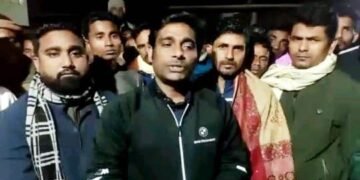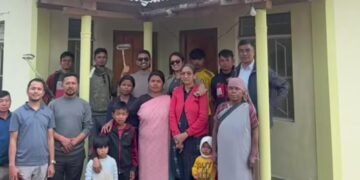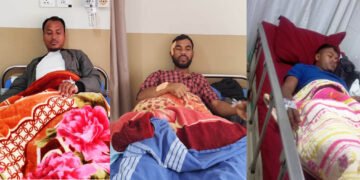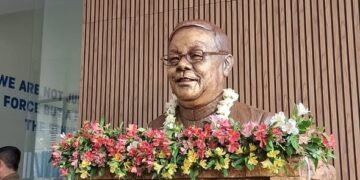More than 1000 of people were rendered homeless after a cyclonic storm hit several villages in Ri-Bhoi, Eastern West Khasi Hills and West Khasi Hills yesterday evening leaving a trail of destruction.
According to a preliminary report by the Revenue and Disaster Management Department, as many as 1061 families have been destroyed by the storm and 25 people were injured across the State.
4192 people in 98 villages were affected by the storm, the department said today.
A three-year-old boy identified as Wiky Lawriniang from Mawroh Laitdom villages in Eastern West Khasi Hills died after his house was mangled by the storm.
Eastern West Khasi Hills is the most affected district with 525 families in 40 villages ravaged by the storm. 15 people were also injured. Two schools were also destroyed.
The injured have been shifted to NEIGRIHMS and Tirot Sing Memorial Hospital in Mairang.
Lawkynter village under Mawthadraishan Block witnessed widespread damage as rooftops were blown away and houses lying in ruins.
In West Khasi Hills, there were 396 families who were affected in 41 villages. These include villages under Mairang Block and Rambrai Block.
In South West Khasi Hills, there were 68 families who were affected in Mawjaraiñ, Nongrim Mawpat, Pyndenumjaraiñ, Umsaw, Nongtynñiaw, New Mawjai, Nongpuiñskei, Mawnore, Mawhiangrnga, Mawkhlaitngap, Mawpat, Rangmaw, Mawsaw, Manad, Phlangdiloiñ, Wahkaji.
In Ri-Bhoi, there were 92 affected families in three villages. Ten people were also injured.
Reports said that the cyclonic storm wreaked havoc in villages under Jirang Block and in Mawhati constituency.
Umshalani and Umsaliang, both under Jirang Block, were the worst affected villages.
In many villages lashed by the storm in the three districts, power supply was snapped as electric poles were uprooted.
Chief Minister Conrad Sangma today said that the deputy commissioners of all affected districts have been asked to complete the relief process for the storm victims within the next 24-48 hours.
Speaking to media persons, Sangma informed that the government had already decentralised the implementation of the relief process since last year.
“So now, the deputy commissioners do not have to come to the State government for any kind of clearance. They can take steps independently at their own level in terms of distribution of basic relief materials as well as different housing support for example CGI sheets to be distributed to the affected,” he said.

